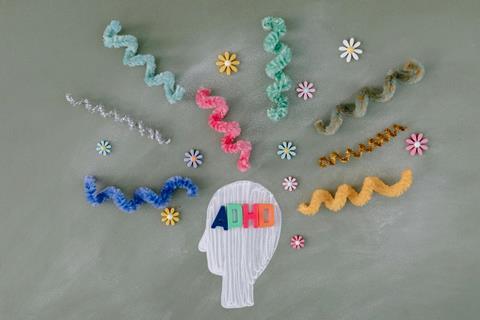If a child has ADHD it can be difficult for Christian parents to think about what obedience and disobedience look like - Abigail Armond provides some helpful thoughts

Does your child or a child in your church have an ADHD (Attention Deficit Hyperactivity-Disorder) diagnosis? If so, what does that mean for their Christian life and discipleship. I had to face this question for myself just over three years ago. While my diagnosis finally explained many of the struggles I’d faced throughout childhood around concentration, schoolwork, sleep, emotional regulation, and self-control, that question kept making its way into my mind. What does my ADHD diagnosis mean for my Christian life and discipleship? Perhaps you’ve asked that same question following a diagnosis for your child or yourself.
If Christians are called to be self-controlled, but I have a diagnosis which says that my ability to have self-control is impaired, does that mean I have access to one less fruit of the Spirit than other Christians?
Weeks after my diagnosis, I listened to a talk on James 3 about what it means for Christians to tame their tongues and use speech wisely by being self-controlled. The speaker used the example of interrupting as something we can easily do but how it communicates a lack of care for and interest in others. I recalled my parent’s daily rebukes on interrupting as I was a child who could rarely hold a thought in her mind until someone else finished their sentence. However, at the same time, I recognised interrupting as a form of impulsivity and a lack of self-control, both textbook characteristics of ADHD. After the talk, I shared my inner conflict with a friend who also has ADHD. Their response was simple: “Those words weren’t for you.” Though well intentioned, their response again raised the question, what does my ADHD diagnosis mean for my Christian life and discipleship? My train of thought went something a something like this…
If Christians are called to be self-controlled, but I have a diagnosis which says that my ability to have self-control is impaired, does that mean I have access to one less fruit of the Spirit than other Christians?
Do I get a free pass on self-control?
What does that mean for the Holy Spirit working in me? Is the Spirit’s work in me limited somehow?
For a parent of an ADHD child, these questions are difficult to ask and often feel even harder to answer because they bring up tensions we don’t always know how to reconcile. You might hear a sermon about patience or self-control and immediately think of the daily battles at home, watching your child struggle to regulate big emotions or feeling frustrated when they keep fidgeting and interrupting as you attempt another devotional time as a family. In those moments, it can feel as though Scripture is holding up an impossible standard, while your lived reality with your child tells a very different story.
when you don’t get things right, don’t forget that in Christ there is abundant grace for both you and your child
Sin & Weakness
“How do you think God responds when your mind drifts as you pray?” I was asked this question while reflecting on my struggles with ADHD and prayer. I didn’t know how to answer at first, I just shrugged. But the person I was speaking with gently reminded me that God knows my difficulty in concentrating. He sees my weakness, and he is not angry with me. Instead, by his grace, I can ask him to bring my mind back to him. Forgetfulness, distraction, or lack of focus may be frustrating, but they are not the same as sinful rebellion. Ed Welch, a Christian counsellor and licensed psychologist, makes this distinction in his book Blame It on the Brain? He unpacks how we can correctly biblically classify whether a behaviour is a spiritual matter (righteousness or sin), or a manifestation of the human body’s weakness and suffering (a physical matter).
- The Spiritual - Comes from our spiritual heart that chooses between righteousness and sin, right and wrong. From it flows behaviour which either embody the Fruit of the Spirit and Christlikeness like patience, self-control, and forgiveness or behaviour which rejects and disobeys God’s commands like jealousy, boasting, and anger.
- The Physical - These behaviours relate to our bodies and reflect our human weakness or suffering as part of living in a world stained by the effects of sin. This includes things like concentration, academic ability, memory, and intellectual disability.
Read more:
3 things additional needs Christian dads need to know
Support for Christian parents of autistic children heading off to a new school this September
So how do these categories speak into parenting a child with ADHD? Well, picture asking your child to clean their room. When you return to check on their progress, you find them playing with their toys instead. Our instinct is often to assume disobedience, and therefore sin. But for a child with ADHD, this behaviour may not stem from wilful defiance. Instead, it may reflect their particular weakness with concentration and memory. Of course, this illustration doesn’t just apply to the neurodivergent child, nor does it suggest that neurodivergent children are never disobedient. Rather, what the two categories helpfully highlight is how we can easily conflate human suffering and weakness with moral behaviour. In other words, we often treat issues of strength and weakness as if they were matters of right and wrong.
If you’re a parent of an ADHD or neurodivergent child, you likely don’t need much convincing about the importance of differentiating between the roots of behaviours. When certain behaviours are misunderstood, it often leads to stigma around neurodiversity.
This is a really complex and often grey area for all parents, whether raising neurotypical or neurodivergent children. It takes time and wisdom to discern what is weakness or sin, and when you don’t get things right, don’t forget that in Christ there is abundant grace for both you and your child.
“Those words weren’t for you”
If you’re neurodivergent or parenting a child who is, I want to encourage you that God’s words are for you. Within current conversations about ADHD, self-control can be diminished to a cognitive function. However, as Christians we know that it is profoundly spiritual. As a Fruit of the Spirit, self-control is not something we can earn but is given to us by God and grown in us by the Holy Spirit. There may be additional challenges for those of us with ADHD as we feel our weaknesses and suffering in particular ways. But God is at work in our weakness. This is such good news because by God’s grace and his Spirit at work in me, I can grow in my Christian life and discipleship. My ADHD doesn’t stop me from accessing every good gift from God. His promises are for us, His Spirit is in us, and his grace is enough.































